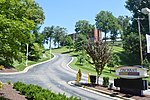Cincinnati Union Terminal is an intercity train station and museum center in the Queensgate neighborhood of Cincinnati, Ohio. Commonly abbreviated as CUT, or by its Amtrak station code, CIN, the terminal is served by Amtrak's Cardinal line, passing through Cincinnati three times weekly. The building's largest tenant is the Cincinnati Museum Center, comprising the Cincinnati History Museum, the Museum of Natural History & Science, Duke Energy Children's Museum, the Cincinnati History Library and Archives, and an Omnimax theater.
Union Terminal's distinctive architecture, interior design, and history have earned it several landmark designations, including as a National Historic Landmark. Its Art Deco design incorporates several contemporaneous works of art, including two of the Winold Reiss industrial murals, a set of sixteen mosaic murals depicting Cincinnati industry commissioned for the terminal in 1931. The main space in the facility, the Rotunda, has two enormous mosaic murals designed by Reiss. Taxi and bus driveways leading to and from the Rotunda are now used as museum space. The train concourse was another significant portion of the terminal, though no longer extant. It held all sixteen of Reiss's industrial murals, along with other significant art and design features.
The Cincinnati Union Terminal Company was created in 1927 to build a union station to replace five local stations used by seven railroads. Construction, which lasted from 1928 to 1933, included the creation of viaducts, mail and express buildings, and utility structures: a power plant, water treatment facility, and roundhouse. Six of the railroads terminated at the station, which they jointly owned, while the Baltimore and Ohio operated through services.Initially underused, the terminal saw traffic grow through World War II, then decline over the following four decades. Several attractions were mounted over the years to supplement declining revenues. Train service fully stopped in 1972, and Amtrak moved service to a smaller station nearby. The terminal was largely dormant from 1972 to 1980; during this time, its platforms and train concourse were demolished. In 1980, the Land of Oz shopping mall was constructed inside the station; it operated until 1985. In the late 1980s, two Cincinnati museums merged and renovated the terminal, which reopened in 1990 as the Cincinnati Museum Center. Amtrak returned to the terminal in 1991, resuming its role as an intercity train station. A two-year, $228 million renovation restored the building, completed in 2018.








